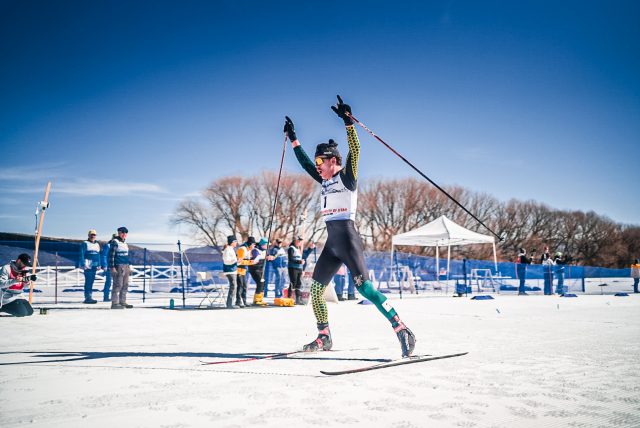
“So after the World Cup, Olympics, and NCAAs, is that it for you this season?”
“Well…I think I’m going to race the Rikert Grand Prix this weekend.” (He won).
I couldn’t have stumbled upon a more apt soundbite to describe Ben Ogden, and he offered it up ten seconds into our interview.
Skiing for the US Ski Team and University of Vermont (UVM), Ogden is primed to write the next chapter in American men’s skiing – a Vermonter who can’t help but love Vermont skiing, a racer who races for the sake of racing. He’s also an author that you get a sense doesn’t want to quite yet claim that he is holding the pen.
For now, then, that pen falls to me:
“If young potential was representing a country, it would have been draped in an American flag.”
I wrote that after the first day of World Cup racing this season in Ruka last November. Ogden, alongside US teammates JC Schoonmaker and Luke Jager – all 21 or 22 years old – had sprinted their way to top 10 qualifiers in the classic sprint. (Schoonmaker eventually made the semi-finals).
It was a line that proved to be a thesis for the US Men’s Ski Team during the 2021-22 season. Each result from Ogden and his teammates – neatly introduced to the world when they won the team relay at the World Junior Ski Championships in 2019 – backing up the argument that the youngest US men were ready to mix-it-up with their European counterparts at the sport’s highest level.
For Ogden, that included a slew of World Cup results in Periods I and II, an Olympics highlighted by a semi-finals appearance in the classic sprint in February, and an NCAA Championship sweep in March.
The juxtaposition in those latter two highlights is cause for pause, so again:
In the same year that Ben Ogden raced the Olympics, someway and somehow, he won an NCAA Championship.
That confluence of talent and time has happened exactly twice before Ogden, and once after. The first before came a half-century ago, when fellow Vermonter Stan Dunklee represented the USA at the 1976 Innsbruck Olympics before winning NCAAs a couple weeks later. The second before came a mere two hours prior to Ogden, when Novie McCabe (University of Utah) won the this year’s women’s 5 k Classic NCAA Championship. Likewise, the one time after came when Sophia Laukli (University of Utah) won this year’s 15 k Freestyle NCAA Championship.
In other words, those who race in the stars-and-stripes were able to will those stars to align in a way that’s never been seen before. Once there was a lone skier able to accomplish the Olympics-NCAA double, and now, after a week in Utah in 2022, there are four.
That represents a paradigm shift in American skiing: a generation of skiers reaching the top of the sport younger than ever before, without allowing themselves stray too far from the American skiing community in which they grew up and remain an integral part in sustaining.
In an interview with FasterSkier, Ogden provided insights into the underlying attitudes that are driving that success among his cohort of top American skiers, with one theme pervading throughout: skiing fast means “skiing” –the places, people, and feelings of joy for which that word comes to connate.
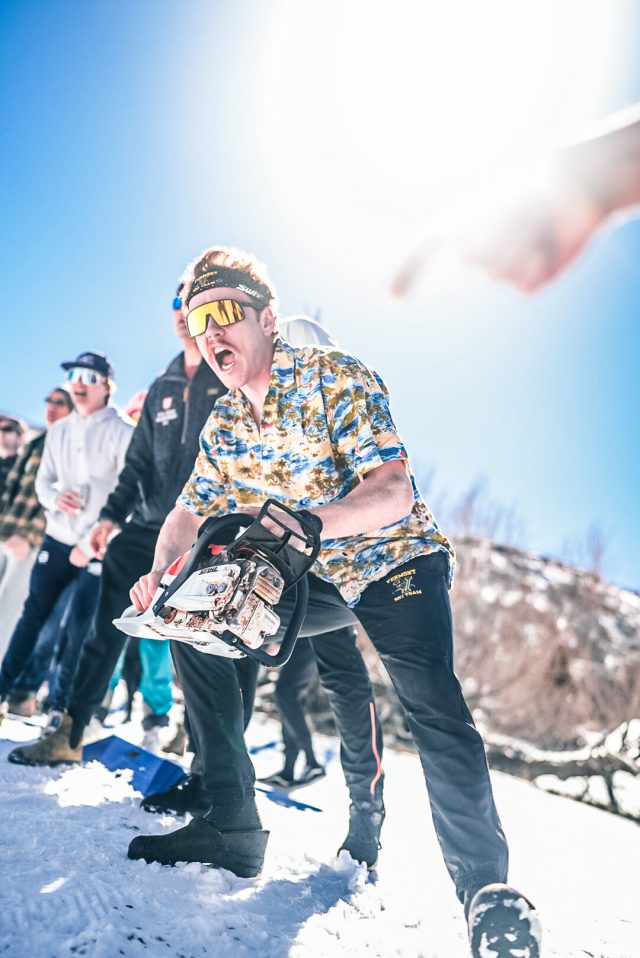
This interview has been edited for length and clarity.
On goal-setting for the Olympics and college skiing through the pandemic:
FasterSkier/Ben Theyerl (FS): There’s been a lot of different levels you were competing on this year – Olympics, World Cup, NCAAs, and now citizen racing – what were you looking at in terms of goal setting coming into this season?
Ben Ogden (BO): Yeah, I knew this year was going to be a big year for goals for me. If I’m honest, a lot of that was because the last two years drove home that you can’t take anything for granted in terms of opportunities.
In a way that pushed me to say ‘you need to try and have your cake and eat it too,’ which meant going to the Olympics and going to NCAAs. That felt weird to shoot for because I knew there were things that were completely out of my control which could keep that from happening. For instance, if I ended up getting COVID while in Beijing, or if I was contact traced, I wasn’t going to be home in time to race the Carnivals I needed [in order to qualify for NCAAs].
I really wanted to do both because this is the only time I could. But I didn’t dare fixate on it too much. It just felt like it would be such a horrendous disappointment if something happened, and I couldn’t. So, in the first half of the season, I really tried to keep my priorities on the World Cup.
I had smaller goals there too, [like advancing] to a semi-final in a Classic Sprint, or qualifying in a Skate [sprint],
Like I said though, ‘having your cake and eating it too’ was the big goal, and it’s just unbelievable that it could happen not only for all three of us – JC (Schoonmaker), Luke (Jager) and I – and also Novie (McCabe) and Sophia (Laukli) on the women’s side. We were all thinking the same way.
It was [our] only chance to do the Olympics and NCAAs and it happened.
FS: That is a pretty sweet moment where the stars aligned…
BO: It’s totally crazy. I mean, like I said, the big thing I went into this season with was the idea that this was my only chance to do [the Olympics and NCAAs].
It made me lucky too. I came into NCAAs with this confidence I took from the rest of the season which was an insane mental advantage. Having results on the World Cup and at the Olympics represented steady progress on other goals that made me ready to complete [the NCAA] one.
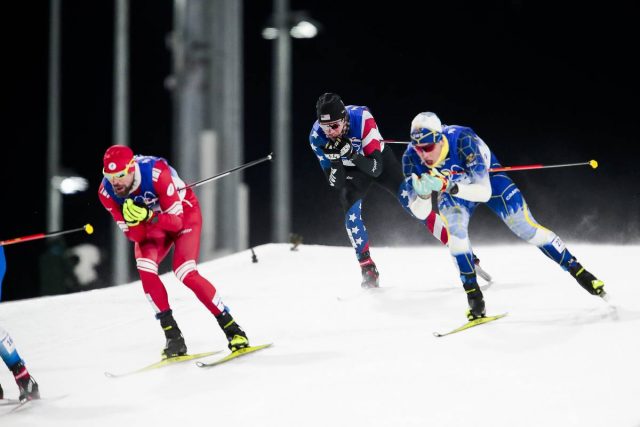
FS: When did those goals that you accomplished this season get set? You took your first NCAA title at the 10 k Classic in Bozeman (in 2020), and then COVID hit before you could go for the 20 k, and everything got weirder from there. How did that affect your long-term goal making?
BO: Bozeman was such a weird experience. What I took from that was actually more of a shift towards my approach to NCAAs this year. I sort of felt like I checked off the NCAA win from my list of goals at Bozeman, so my goals were more team-oriented [for UVM]. That meant trying to get everybody psyched, make a connection with the Alpine skiers, and see if we could get them fired up to lift UVM to a great team finish.
FS: You certainly did your part on that front. You became the 14th male skier to sweep NCAAs*. You’re also the first male American-born athlete to do so**. Any reflections on what that means to you?
BO: I’m really proud to put my name on that list, obviously. There are some really talented skiers who have done [a sweep] in the past. Like I said, I was really obsessed with the team scoring, so I was focused on doing everything I possibly could there and didn’t realize I was the first [male] American ever.
But that feels really good.
FS: This is me being a reporter here, but to me that speaks a lot to you and the group of guys you’re with on the US team who are really pushing American skiing forward. Like that checks off a big box with an American doing that at NCAAs.
BO: Totally, it’s another thing to be really proud of between all of us.
On following his sister Katharine’s NCAA Success:
FS: I should add that while you were the first American man to complete an NCAAs sweep, you weren’t the first Ogden. I have to ask, was Katharine having done this a couple of years ago (KO swept NCAAs at Steamboat Springs in 2018, she also won the 15 k Classic in 2019) on your mind going into this year?
BO: Oh yeah. It’s kind of funny, actually. I remember last year, I tried to petition the NCAA to race at Nationals because I couldn’t race some Carnivals due to COVID restrictions. When my petition wasn’t accepted, I remember thinking to myself, ‘Well, there goes my only opportunity to tie Katharine.’ But that was more of a funny thought than a driving force for me. I told someone else that was asking me that it didn’t matter if I tied her number of wins. But to do it was pretty cool…
I should be clear though, my wins certainly weren’t in as commanding a fashion as hers. I remember going to Stowe when I was a freshman [in 2019] and while we were warming up for the 20 k I turned my head and was like, ‘Oh, there goes Katharine’ and there was no one else in sight. It was like, ‘My gosh, this is insane.’ That’s not even talking about Steamboat (in 2018) which was pretty darn cool. She not only swept, but helped carry Dartmouth to one of their overall better finishes.
So yeah, all that makes it feel really good to match her in wins and take UVM to a 2nd place, which is pretty exciting for us.
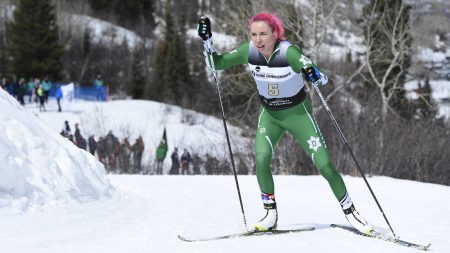
On UVM and college skiing this year, and their place in his development as a skier:
FS: On that UVM front, your team was really back to dominating the EISA this year. How did that come together? And how has that program helped you develop as a skier the past few years?
BO: When I was a freshman, we had a bunch of older guys on the team that were getting UVM great results. When they graduated, we were still very good in the EISA, but we weren’t quite as dominant. It took some time to get back.[For example,] Jacob Nystadt, our Swede, is a sophomore this year, and it was the first year he could figure out the rhythm and training that works for the college circuit (after the EISA raced an abbreviated season last season).
We have such a talented team and push each other hard in every interval. Everyone helps out with the motivation, and we’re all on a very high level where we know it’s not just about training hard, but training smart as well.
One of our strengths is that we all have a different upbringing and bring something unique to the table. Our NCAA Championship team this year was a Norwegian, a Swede, and an American, and beyond that there’s even more geographic diversity from across the country and the world. That all comes together to build and balance training, and then we can put it all together on the racecourse.
FS: How does (Patrick) Weaver (UVM Head Coach) contribute to that? How do you and him work to balance the NCAA skiing along with the World Cup side of things on the US Team?
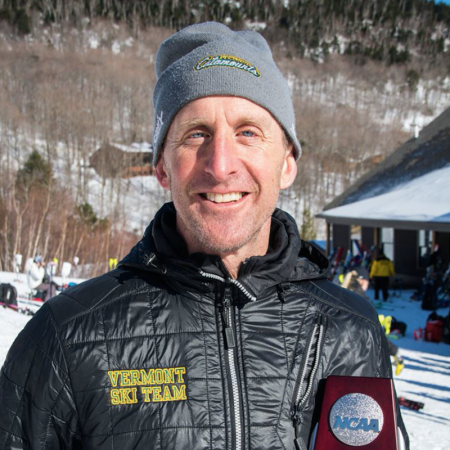
BO: Patrick has been a huge part of my development as a skier. I feel like I’ve gotten so much stronger in my four years at UVM, and that’s all due to him. I think our philosophies towards skiing line up remarkably well, which comes from him having a similar experience – being an Olympian, being on the World Cup, skiing professionally for many years, but still wanting to, and having, skied in college. At every turn, he’s had advice for me that comes from the perspective of someone who really wants me to succeed in skiing on all levels. He’s not just interested in seeing me do well at NCAAs or at Carnivals, but instead supports me no matter what I want to do.
This year there were a few moments where it looked like it might be questionable whether I could race World Cups and make it home to compete in some Carnivals. But when it came down to it, Weaver left the decision up to me, which really made a difference. If you have a coach trying to force you to do something that you don’t want to do, it’s not conducive to happiness in your skiing. And Weaver stresses that; happiness is the driving factor towards speed. You can train like a madman, be in the best shape ever, but if your head isn’t in the right place, and you’re not doing what you think is important, then you might as well not be training at all.
Weaver’s understanding of that was a huge part of my ability to achieve my goals this year. College skiing is where I’m happiest, he knows that, and his understanding of why that is a big part of our ability to achieve our goals as a team this season.
FS: Within that season, was there a moment where you got nervous about whether the NCAA Championships were going to be possible? Like when you went to the [first race of the year] at Colby, and they cancel the second day (due to cold weather), did it make you go, ‘Crap, I need to find another Carnival now?’
BO: Oh yeah. That was a case in which Patrick and I were talking and like, ‘Oh gosh, this could be the end right here.’ We changed my plans to book a flight home from [the Olympics] on February 17th so that if I needed, I could race just the second day of the Middlebury Carnival on February 19th. It would have been insane, but I would have done it just to get the points I needed.
Patrick talked to the EISA and thankfully all the coaches were like, ‘No, that’s totally fine. Three races (all of which Ogden won) and the Olympics are plenty to qualify [for NCAAs].”
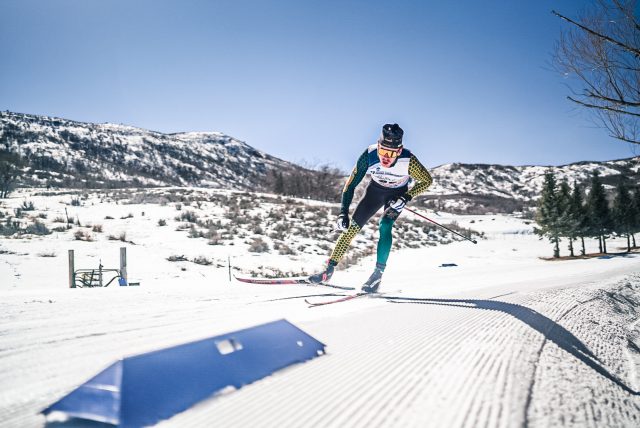
On the fun of racing the NCAA Championship Mass Start:
FS: Did you end up watching the NCAA 20 k footage at all?
BO: Yeah, actually, I did.
FS: I was curious what your race plan was going into that mass start?
BO: Haha, well you know, and I think you can tell by watching that race, I’m not exactly known for my detailed race plans. In that race in particular I knew that I was going to have to be careful – the alpiners (from UVM) and all my friends I grew up skiing with in Vermont were out there, and with them cheering from lap one there was a good chance I just got revved up and went for it then.
I figured my best chance at winning would be to wait until the last lap and try to make it happen there, but then, you know, I was riding a high from winning a couple days earlier and the dream of winning off the front kept popping to my head. If you watch the race closely, you saw my move on lap four (of six), which was the definition of wishful thinking.
I went up that hill, came around to take a feed on lap five and I was like, ‘Oh God, what have I done?’
But I ended up finishing the race and got away with it.
It’s funny because so many people after the race were like, ‘Oh man, you’re built different, you’re toying with the field out there’ and I was like, ‘Oh that’s not at all how it felt.’
FS: You can count me in that lot. I was watching you bounce back and forth at the front going, ‘Man, he’s like the leader of the peloton, he’s got it under control!’
BO: (laughs) Well on Cabin Hill, it didn’t feel like that. We went up the Hollow and I looked around at who was with me and thought I was maybe playing for a podium. I was able to tuck into the pack to stay up in front, and then Bernie (Flaschberger, from Denver University) went forward on one of the sprint hills. I thought he was going to drop us, but I tried to ski up and was surprised that I could stay with him. That’s when I began to think maybe I can do this, and so I went for it. Again, it was the extra confidence for sure.
FS: I think for us, who watch you on the World Cup all the time, it was a different side of your racing to watch. To see some of the maneuvering was pretty cool.
BO: I tell you man, it’s a real treat to race at the front of a mass start. I did quite a few mass starts on the World Cup this year, but there I’m starting in bib 70, the accordion in the field is so aggressive, and it is just so hard to move up.
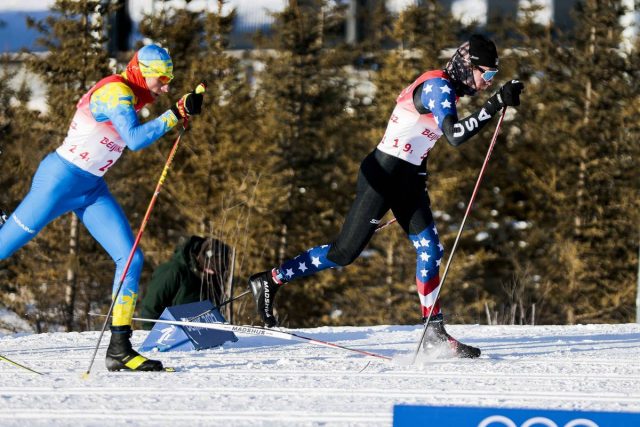
On the US Ski Team’s success this season, and what comes next:
FS: I know you’re racing the Rikert Grand Prix this weekend, but with your season being pretty much over I was wondering if you’d be willing to share some early reflections on a pretty amazing season for you and your teammates on a lot of different fronts?
BO: Yeah, I’m really happy with what I’ve done this year.
FS: Do you have an early favorite moment at all?
BO: Again, it’s early still, but I would be surprised if there’s a lot of moments in my ski career that rival that 20 k at NCAAs as far as how cool of a race it was. There were so many people that I knew out there cheering, and then after it was just instant happiness with everyone out there. Good race, bad race, whatever, everyone was ready to relax, cheer on the women’s race, and just enjoy the most perfect day in the Utah sun. Can’t ask for anything more than that.
I shouldn’t discount the moments on the World Cup that were a lot of fun either. Reaching the semi-final at Davos was really exciting, and then the semi-final at the Olympics after was a crazy, cool race. Those are the moments that motivate me for World Cup racing in the future because I wasn’t on the top, but I got a real taste of what it’s like to be in the mix.
The big takeaway from this year for me is that the best skiing happens when you’re having fun, and I couldn’t be luckier with the group that I have [at UVM] and that I’m with on the World Cup. JC, Luke, and Gus – they really are my best friends, skiing or not, which is incredible. With being on [those] teams, you’re somewhat placed in those groups randomly, right? They don’t choose the World Cup team based on personality. And yet, if you have a good group, it makes the World Cup experience 1000 times better. I’m sure that there will be seasons and races in the future where we’re not quite feeling like the kings of the world every other weekend. That’s when I’ll come back to memories from this season and remind myself of what’s important.
FS: It’s pretty darn cool to watch you guys. My coach Tracey Cote at Colby used to say when she started in college skiing back in the late 1990s she would watch the World Cup and the Carnival skiers and they didn’t look anything alike, and maybe five years ago, she said we’d gotten to where Carnival skiers were starting to look like those skiers on the World Cup. I think with you, it’s the next step – the Carnival skiers are on the World Cup. Do you guys have a notion that you’re pushing the sport forward, especially on the men’s side, in the US?
BO: A little bit, but I think that’s more something people say to us than what we’re focused on.
I think for us it’s demonstrating that racing in College is fun and we all understand that the World Cup can be too. Sometimes, people just take themselves way too seriously on the World Cup, and I think that only serves to detract from their ability, and at the end of the day, their happiness too.
I guess it feels like we’re pushing the limits a little bit by doing that, and with our results, but really one of the things that makes us all so cohesive is the shared sense that what we dream of in skiing is a lot bigger than what we’ve done so far.
With that sense, every race sort of feels like it’s already a piece of the past, if that makes sense. For example, that sprint at the Olympics was awesome for me, and I patted myself on the back. But then again, I looked around and everyone on the team could say ‘Your dream is to be better’ and because of that I can see myself being in the final or on the podium one day.
I know the other boys think the same way, and that’s what is really fun about the whole group. We all finish a race and we’re all already talking about what we could have done better and what type of training is going to help make us faster in that realm. And now, because of that, we’re motivated, and we’ll talk about it all summer and train together too.
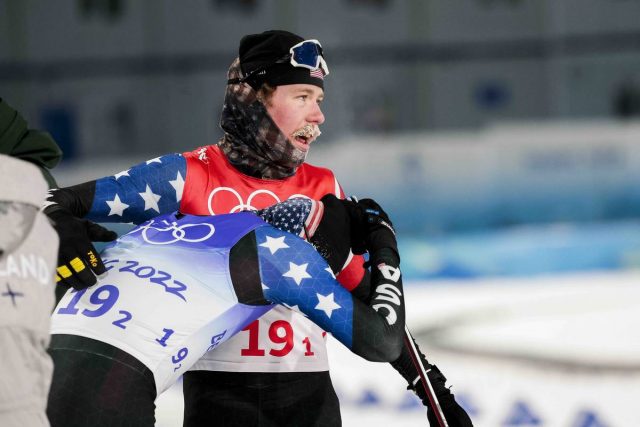
FS: Yeah, like one of you guys said in a comment to Nat (Herz), [FasterSkier’s Olympics Correspondent], that there was a race at the Olympics where you were skiing along and Klæbo passed you, and you were like ‘holy crap I can ski with him, even if it’s just for a hill. Like, the goal is one day to ski with him much longer but that’s down the road.’ I thought that was a great metaphor for where you guys are in your skiing right there.
BO: That was definitely me in the 15 k classic. He lapped me and I skied with him up the hill and then over a little of the flat, and yeah, he beat me by how many minutes? But you know what, for that five-minute stretch there I could ski with him. That gives you an idea for what it takes to be where your goals are. I’m glad you picked up on that.
FS: Lastly, with you being a senior undergrad at UVM, I wanted to see if you could give us any leads on where we might see you skiing next year?
BO: I don’t know exactly. I’m just starting to get my head around it after NCAAs, but I’ll have a meeting with Weaver and see what he thinks and talk about what I want to do. I had big plans to just do an accelerated master’s in Engineering and stay at UVM for a fifth year. That was a year ago though, and then between the Olympics and World Cup I ended up missing 7 weeks of school. So, I had to ease off on that.
It comes down to aspirations outside of skiing, which I definitely have, but with things taking off like they have this year I probably see myself doing something similar to this year at this moment. I don’t not see myself in school next year, and I still hopefully can balance it with whatever comes next with the next ski season.
FS: Well, wherever life lands you, I know I speak for a lot that we’ll be looking forward to seeing you ski, and congratulations on an incredible season.
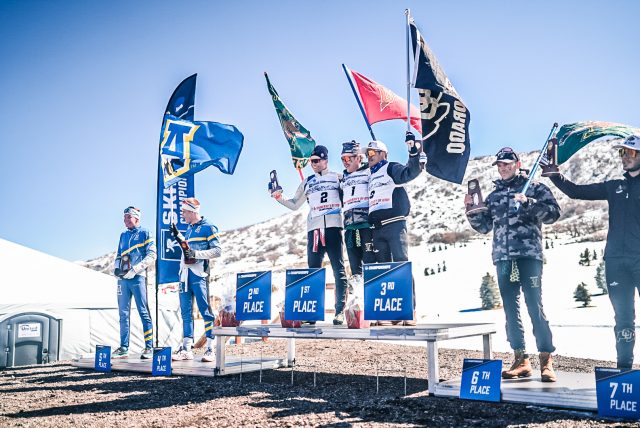
NCAA History Notes:
*Ogden is the 9th skier to win NCAAs in its current format, winning both the 10 k Classic and 20 k Freestyle. This format has been skied since 1989. In the decade prior to the change from 1980-1988 five skier swept NCAAs by winning both a 10 k Classic and 3 x 5 k Classic Team Relay.
**Ogden is the 2nd American citizen, after Norwegian immigrant John Aalberg completed a sweep for the University of Utah in 1984.
Ben Theyerl
Ben Theyerl was born into a family now three-generations into nordic ski racing in the US. He grew up skiing for Chippewa Valley Nordic in his native Eau Claire, Wisconsin, before spending four years racing for Colby College in Maine. He currently mixes writing and skiing while based out of Crested Butte, CO, where he coaches the best group of high schoolers one could hope to find.



